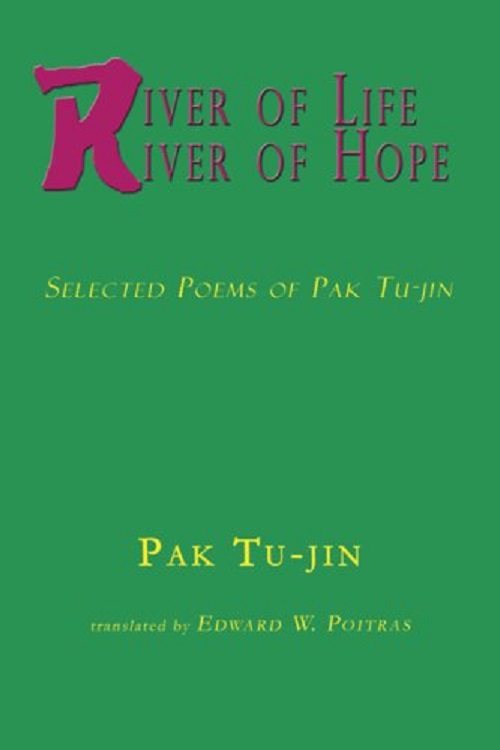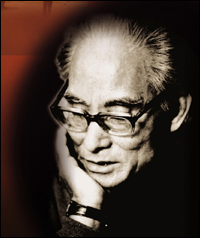Pak Tu-jin (1916-1998) is the late poet who found a new voice and saw the reflection of human beings in nature. For the poet himself, nature was a fountain of solitude and a provider of comfort and peace of mind at the same time, as can be seen in his series of poetic works.
In his “Tobong Mountain,” nature is personified as it responds to all kinds of human sorrow and pain.

A mountain bird comes
And does not call,
The clouds have left
And do not return.
All human traces far behind,
I sit alone
As autumn dusk covers the mountain.
As I bellow and call
There is no one to hear,
The echo returns useless
Up the empty valleys.
The shadow of the mountain lengthens
The sun sets red
In the twilight
Stars appear and begin the night,
Life grows sadder as I live on
And love brings only pain.
It is for you that I pass this
Long night with its sadness,
While you spend the night resting
In some village I know not where.
-From “Tobong Mountain” –
Another work, “Sky,” shows that human beings slowly assimilate with parts of nature, the sky in this case, and become united with them.
The sky comes to me.
Tenderly, delicately,
It comes from afar.
The sky, as it comes close from its distance
Is as blue as a lake.
I am embraced
By the lake-blue sky,
My whole body is enfolded.
Into my breast, into my heart
Soaks the sky
The fragrant breath of the sky.
My neck is washed
In the warm light,
This warm sunlight of early autumn.
I drink the sky.
Unslaked, I drink again and again.
In drinking the sky
I ripen.
Like an apple my soul ripens.
-From “Sky” –
This anthology, published in English to reach a wider audience, features 78 of Pak’s poems, all which center around nature and mankind, including “Sun,” “On a Green Mountain Trail,” “Song in a Graveyard,” “August River” and “In Clouds of Flowers.”
 Born in March of 1916 in Anseong, Gyeonggi-do (Gyeonggi Province), Pak Tu-jin made his literary debut with his contributions to the literary magazine Moonjang in 1939.
Born in March of 1916 in Anseong, Gyeonggi-do (Gyeonggi Province), Pak Tu-jin made his literary debut with his contributions to the literary magazine Moonjang in 1939.
Pak worked as a professor at Yonsei, Woosuk, Dangook and Ewha Womans universities, as well as at Chugye University for the Arts.
He is regarded as one of the most prolific poets in modern Korean literature, creating more than 30 collections of poems about nature and God, as well as essays and critical reviews. Some of his works include collections of poems, “The Spider and the Constellation,” “Alpine Plants” and “Chronicles of Water and Stone.”
Edward Poitras has translated Pak’s “River of Life, River of Hope,” and other selected poems by not only Pak, but other modern poets, too. Named Park Dae-in in Korean, Poitras lived in Seoul from 1953 through 1989, where he taught at the Methodist Theological Seminary. He has also translated fiction by novelist Hwang Sun-won, too, including his volume, “The Starts and Other Korean Short Stories.” He has also created numerous essays in fluent Korean, including “Persimmons, Winter and Koreans.”
*This article has been made possible by the cooperation of the Literature Translation Institute of Korea.
By Sohn JiAe
Korea.net Staff Writer
jiae5853@korea.kr
In his “Tobong Mountain,” nature is personified as it responds to all kinds of human sorrow and pain.

A collection of Pak Tu-jin’s selected poems, “River of Life, River of Hope,” is now published in English.
A mountain bird comes
And does not call,
The clouds have left
And do not return.
All human traces far behind,
I sit alone
As autumn dusk covers the mountain.
As I bellow and call
There is no one to hear,
The echo returns useless
Up the empty valleys.
The shadow of the mountain lengthens
The sun sets red
In the twilight
Stars appear and begin the night,
Life grows sadder as I live on
And love brings only pain.
It is for you that I pass this
Long night with its sadness,
While you spend the night resting
In some village I know not where.
-From “Tobong Mountain” –
Another work, “Sky,” shows that human beings slowly assimilate with parts of nature, the sky in this case, and become united with them.
The sky comes to me.
Tenderly, delicately,
It comes from afar.
The sky, as it comes close from its distance
Is as blue as a lake.
I am embraced
By the lake-blue sky,
My whole body is enfolded.
Into my breast, into my heart
Soaks the sky
The fragrant breath of the sky.
My neck is washed
In the warm light,
This warm sunlight of early autumn.
I drink the sky.
Unslaked, I drink again and again.
In drinking the sky
I ripen.
Like an apple my soul ripens.
-From “Sky” –
This anthology, published in English to reach a wider audience, features 78 of Pak’s poems, all which center around nature and mankind, including “Sun,” “On a Green Mountain Trail,” “Song in a Graveyard,” “August River” and “In Clouds of Flowers.”

Poet Pak Tu-jin
Pak worked as a professor at Yonsei, Woosuk, Dangook and Ewha Womans universities, as well as at Chugye University for the Arts.
He is regarded as one of the most prolific poets in modern Korean literature, creating more than 30 collections of poems about nature and God, as well as essays and critical reviews. Some of his works include collections of poems, “The Spider and the Constellation,” “Alpine Plants” and “Chronicles of Water and Stone.”
Edward Poitras has translated Pak’s “River of Life, River of Hope,” and other selected poems by not only Pak, but other modern poets, too. Named Park Dae-in in Korean, Poitras lived in Seoul from 1953 through 1989, where he taught at the Methodist Theological Seminary. He has also translated fiction by novelist Hwang Sun-won, too, including his volume, “The Starts and Other Korean Short Stories.” He has also created numerous essays in fluent Korean, including “Persimmons, Winter and Koreans.”
*This article has been made possible by the cooperation of the Literature Translation Institute of Korea.
By Sohn JiAe
Korea.net Staff Writer
jiae5853@korea.kr